Minna Atherton Roars To League’s First World Record In 54.89 Over 100 Back in Budapest
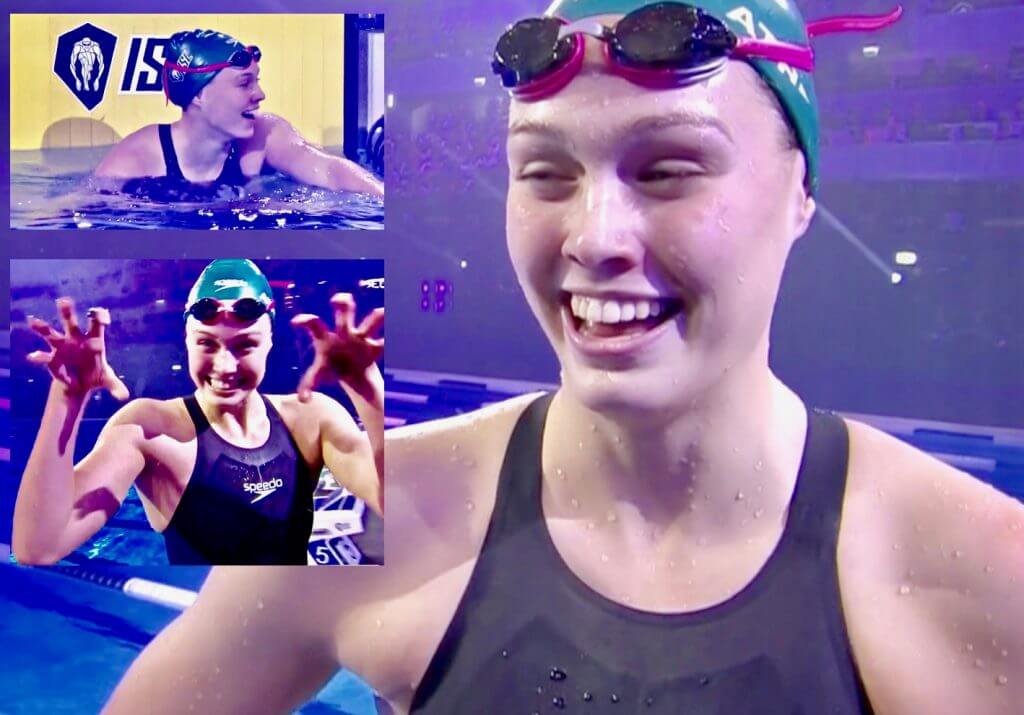
Minna Atherton World Record – Will FINA allow it?
John Devitt: if you’re out there tuning into the League, fellow Aussie Minna Atherton just swam the 100m backstroke a fingernail slower than your first World record over 100m freestyle back in 1957. Her efforts helped London Roar to dominate the fourth Match of the International Swimming League in Budapest.
Devitt, Olympic 100m free champion in 1960, will be dazed and dazzled: 54.89, off 26.52 at half-way. Yes, his was long-course and yes, he was .2 quicker but the comparison tells a tale of time passing and progress.
There’s a section of Pat Besford’s Encyclopaedia of Swimming that lists “obsolete World records”, those set over 100 yards and 110 yards. The last ever held by men were in 1954, at 55.7 for Yoshi Oyakawa (USA) and over 110y at 1:00.1 for Roland Matthes (GDR) in 1967.
Matthes, Rolls-Royce of Backstroke. In a long-course pool he set seven World records, the last one the 56.30 in which he retained the 100m Olympic crown in Munich.
Imagine that, a girl from Brisbane travelling around the same pace, courses considered.
Stunning speed from Atherton. The swim marked the first moment a woman raced inside 55sec over 100m backstroke; and the first time the new International swimming League witnessed a World Record.
How now, FINA? Will this be ratified? It must be, roar the Roar and many others around the world who do not want the international federation to lead a schism in swimming because of its fight, legal and in guarding jealously a monopoly it has held since 1908, with the ISL.
More on the swim and the rest later. For now, Atherton emerged from a race in which she took down the previous global standard of 55.03 that had stood to Katinka Hosszu since 2014, to say:
“It’s amazing. I can’t really believe it. I’m super happy with that swim, especially after the relay. Was just a bit off (in the relay) and came back and gave it a red-hot crack.”
On the Roar bench, coach Mel Marshall had to hold coach David Lush up as he collapsed back on his seat. Minna’s mentor since she was 11 at Brisbane Grammar, Lushy said:
“It’s fantastic. I’ve been coaching Minna since she was 11 years of age. To be part of that journey is amazing. I’m almost at a loss for words.”
The World Record – Minna Artherton – 54.89
Will FINA Allow The World Record Or Will Schism Rule The Pool?
FINA is “most likely” to ratify any World records set in International Swimming League (ISL) competition because the international federation wishes “to avoid further legal action and an escalation of the swimmers’ revolution”, a source close to the top table of the organisation has told Swimming World.
Whether that is the outcome we can expect remains to be seen.
In Indianapolis when the ISL got going in early October, Katie Ledecky clocked 3:54.06 to dominate the 400m freestyle. The Olympic champion and long-course World record holder shattered the American record and fell just 0.14sec shy of the World short-course record held by Ariarne Titmus.
The Australian, who defeated Ledecky for the World long-course title back in July, finished second in Indianapolis on 3:57, the speed at which Katie Hoff had held the American record before Ledecky.
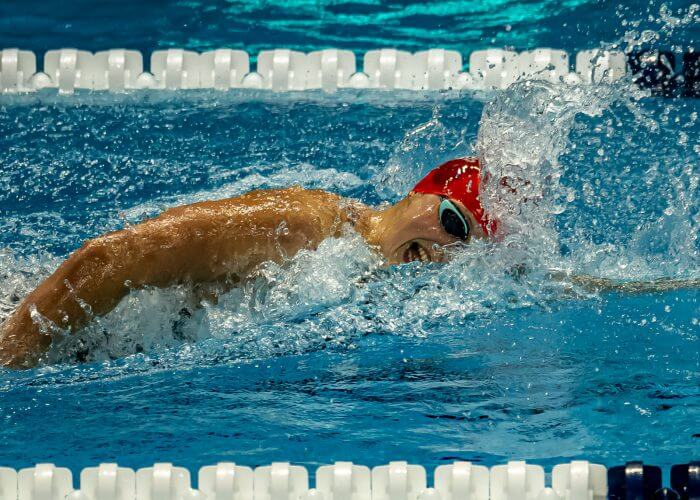
Katie Ledecky – Photo Courtesy: Peter H. Bick
When she was informed that there was doubt about whether any World records set in League racing would count, Ledecky, already a legend of the fast lane as the fastest distance freestyle woman swimmer in history, said:
“I didn’t even know that was true, or if it is true. I think all times should count if we are following all the rules, which we are. That is the way it should be.”
FINA’s issue is this: of the seven competitions the ISL will stage, including the Final Match showdown of the four best of eight teams in the League in Las Vegas on December 21-22, the Indianapolis event last weekend, and the Naples match of the same four teams this coming weekend clash directly with World Cup events.
The international federation approved only those ISL events that do not clash with existing FINA competition. Last December FINA, after a period in which it threatened swimmers with bans if they raced at a League test event that had to be cancelled because FINA would not give approval, stated:
“As to the issue of alleged athlete bans resulting from participation in unsanctioned events, FINA merely stated that results achieved in competitions for which approval and sanction were not duly sought and obtained would not be recognised”.
Swimming World has had no response from FINA – for over three weeks now, on the question of whether it will recognise World records at all ISL events. There is also the matter of swims being recorded in world rankings beyond FINA but never making it to the federations’s official lists. The consequence is a divided record of the sport, with FINA all-time rankings and records differing from those collated by others and of more interest to media and fans.
USA Swimming provided instant clarity on national records: any American records set in Indianapolis, including Ledecky’s and a 2:04.18 in the 200m medley from Melanie Margalis, will stand. Australia, too, will count the records of Artherton, while the Commonwealth standards are also likely to stand.
FINA is yet to issue any official clarification on World records set in ISL racing. A source close to the top table of the organisation told Swimming World: “The position is that if you put your event on top of a FINA event, then FINA will not approve the meet and no results will be recognised. There’s another reality, of course. If a swimmer like Ledecky breaks a world record, how can FINA ignore it?”
Asked if discussion on the topic had taken place at the highest levels of FINA, the source said:
“Yes, of course. The feeling is that FINA competition must be protected. On the other hand, it is open to question whether specific rules have been broken depending on the interpretation of the grounds on which FINA approve a competition … other rules that cover standard competition things, including doping controls, are being observed. There is also a lot of concern over litigation and FINA is likely to want to avoid further legal action and an escalation of the swimmers’ revolution”.
FINA is challenging a class-action lawsuit brought in 2018 on behalf of three-times Olympic gold medalist Katinka Hosszu of Hungary and U.S. Olympic gold medallist Tom Shields and fellow American World short-course champion Michael Andrew. At the same time, The ISL mounted a parallel action of its own aimed at FINA relinquishing its 110-year monopoly of elite global swimming – and won the latest round of that challenge earlier this year.
Hosszu, for her own Team Iron, Andrew for the NY Breakers team run by his mother, Tina Andrew, and Shields, for LA Current, are all signed for League action and will make their ISL debuts in Dallas the weekend after next.
The class-action case was brought after FINA refused to grant approval for a competition set for last December in Turin around the time of the World s/c Championships. Instead, swimmers turned up for a gathering in London aimed at garnering support for the League and educating them in collective-bargaining processes.
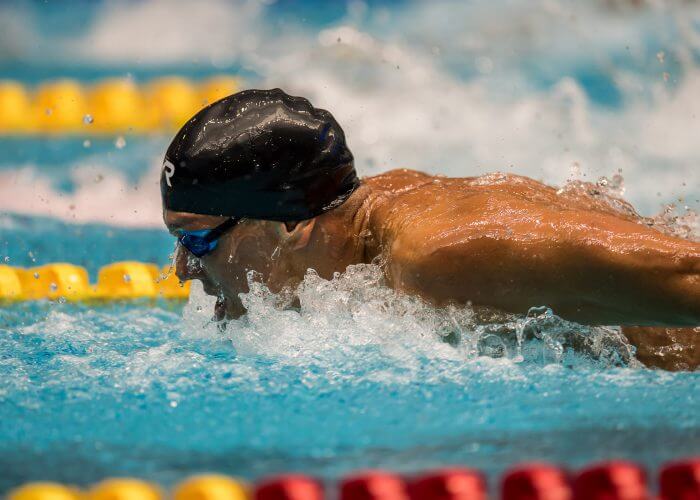
Tom Shields – Photo Courtesy: Peter H. Bick
“FINA’s insistence that the world’s best swimmers may compete only on FINA’s terms and its efforts to enforce that rule are nakedly anti-competitive,” said the lawsuit the swimmers said was filed “on behalf of elite swimmers around the world”.
FINA threatened federations that failed to suspend swimmers for racing at events that it had not approved. However, it had to climb down from that when the level of support for the League among the very best swimmers in the world became all too clear as 30 Olympic, World and continental champions gathered in London to pledge their support for the League.
Many, such as Adam Peaty, Sarah Sjostrom and Hosszu, have had European law on their side ever since the European Commission declared in December 2017 that
“International Skating Union (ISU) rules imposing severe penalties on athletes participating in speed skating competitions that are not authorised by the ISU are in breach of EU antitrust law. The ISU must now change these rules.”
That ruling would be rolled out to any sport, said the authorities, own receipt of any justified complaints from athletes.
FINA shifted its stance, stating late last year: “FINA remains open to proposals that would enhance – rather than conflict with – current and planned competition calendars, providing further opportunities for aquatics athletes, and ideally in a manner that benefits the whole sport.”
Meanwhile, Naples gets ready to rock. Anyone in World-record form who delivers on that will surely wish to have a World-Record Application form filled out and sent in to FINA.
ANALYSIS
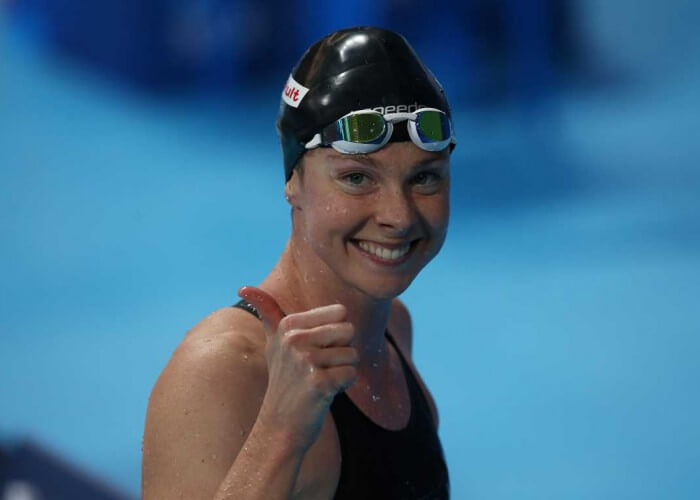
Photo Courtesy: Ian MacNicol/Swimming New Zealand
The challenge for FINA is then very clear: the precedent they set themselves is challengeable in law.
When Lauren Boyle of New Zealand set a world short-course record of 15:22.68 over 1500m freestyle, on August 9, 2014, in Wellington at Winter Championships, her national federation had allowed the pool to be configured in a way that meant the dive end was too shallow to meet the Minimum Standard Pool limits of FINA’s Facilities Rules.
The referee must sign to confirm on the World Record Application Form that “All FINA Rules” had been complied with. But they had not been complied with.
No matter, replied FINA: it overlooked and overrode its own rules, even sending to this author a statement that the technical committee had agree that “Facilities Rules do not apply for World Records”.
In other words, the length of the pool, the size of blocks and all other dimensions of standardisations of competition pools are irrelevant. That, of course, would have been open to legal challenge should any challenge ever have been brought.
FINA’s weak argument could hardly be clearer. For example:
- had Lauren Boyle swum in a 10-yard pool 30cms deep, would that have been alright – and which rules would we have turned to for such circumstances to be ruled out of order?
- were a swimmer to set a world record this weekend get a thumbs down from FINA would it stand in law that the only reason to refuse ratification was that FINA was holding its own party in Berlin that particular weekend (this weekend)?
Athlete welfare and safety
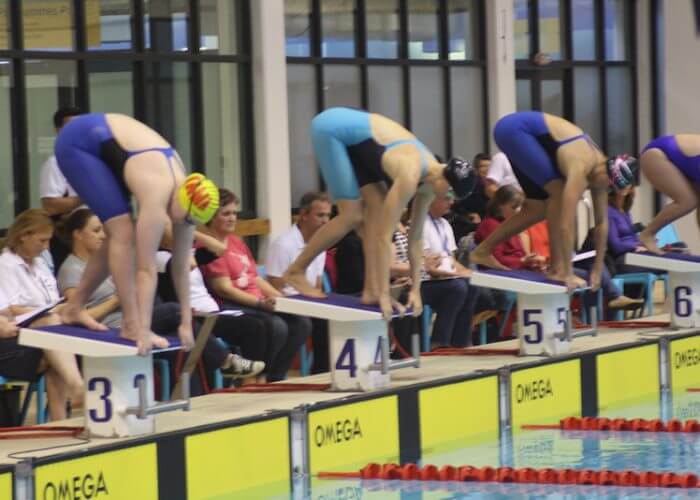
Lauren Boyle at the start of her speedy 1500m swim in Wellington – Photo Courtesy: a Swimming World reader
In the case of the Wellington pool, there is an added reason why both FINA and its national-federation member and associated local organiser should have exercised caution and care: complaints at the pool have included those from parents whose children lost teeth and sustained head injuries while diving into a pool too shallow to meet standard FINA safety rules.
A colleague from New Zealand notes that Swimming Wellington refused to start the races at the deep end, because it was easier starting them at the shallow end where the recorder room is. It seems, therefore, that they either had no idea about the FINA rule or simply didn’t care.
As a result of those complaints from parents of injured children, the New Zealand Health and safety at work Act changed in 2015. And in turn, Swimming NZ rules changed from June 2017.
FINA might have called a Disciplinary Panel hearing, called on Swimming New Zealand to justify its breaking of international rules, fined said federation for breaking such rules, noting that those rules are designed to preserve the health and safety of swimmers (prime asset; raison d’être) and then taken a view on whether Lauren Boyle was at fault in any way. FINA did none of that.
Boyle’s standard might have stood, on grounds that she did not benefit from her federation’s fault. Notice of such a decision could then have been sent to all member federations with notification of the fine and warning handed down to the NZL federation as a clear signal to others not to take the same path. FINA did none of that.
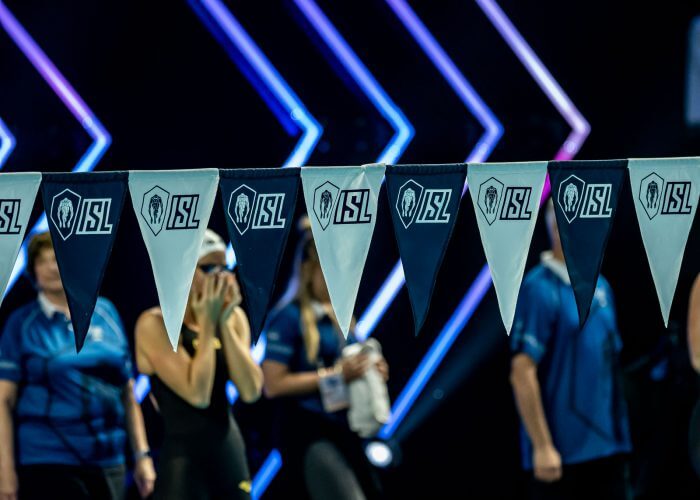
The Swim League stage is set – Photo Courtesy: Peter H. Bick
Over To FINA
The next question for FINA is clear: given that the League is far from being the only organiser of swimming competition in the world this weekend (and many of those other events are approved), on what grounds will the international federation justify a refusal to ratify a World record should one fall?
The only one left is this: our event was on the calendar before your’s. The trouble for FINA is that the bulk of world-class swimmers have chose the League not the World Cup. And the reason for that highlights another lesson FINA has yet to show it learned: the World Cup, through all the years when there was no alternative there, has withered on the vine and failed, year after year, to attract the bulk of the best swimmers in the world.
The outcome of a FINA refusal to ratify records at an event highly popular with those best in the world is something that no-one is likely to want: two record books, a fragmented and divided sport.





Vincent Laperle ?
Brilliant
Totally awesome